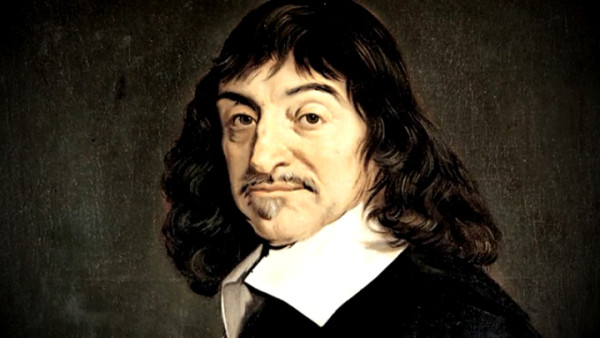Exorcising Epistemology
by Matthew Becklo
Filed under Belief
Two fantastic articles at Strange Notions in recent weeks have turned from the question of God to the question of the human self. In “Atheism and the Personal Pronoun,” Patrick Schultz explores what he calls a “doorstop” argument for the soul: under materialist atheism, we are mindless machines, but given that every one of us is inescapably a subjective “I,” materialist atheism looks false. In “Exorcizing the Ghost from the Machine,” Matthew Newland counters this argument by looking at brain-mind causality, naturalistic “emergence,” and split-brain research, concluding that the conscious mind may very well be a kind of “city” of proto-minds operating in unison. I find points of agreement in both pieces, but would like to reframe the question from a third perspective. (If nothing else, I hope this whole discussion is a reminder that there is room in the Catholic Church for vastly different conclusions on some very fundamental questions.)
There’s an old Irish joke that Richard Dawkins recounts as well as anyone in The God Delusion:
“A journalist, researching for an article on the complex political situation in Northern Ireland, was in a pub in a war-torn area of Belfast. One of his potential informants leaned over his pint of Guinness and suspiciously cross-examined the journalist: “Are you a Catholic or a Protestant?” the Irishman asked. "Neither," replied the journalist; “I'm an atheist.” The Irishman, not content with this answer, put a further question: “Ah, but are you a Catholic atheist or a Protestant atheist?”
The absurdity of the joke is that the Irishman is so entrenched in the local standoff that he can’t help but see a hapless outsider as belonging to one side or the other. As far as he’s concerned, there is no third option.
This is a perfect analogy for what has happened with modern philosophy of mind. Instead of Catholics and Protestants, we have rationalists and empiricists; instead of Jesus, our common reference point is Descartes. And instead of unbelievers, we have those who doubt the wisdom of the epistemological turn inaugurated with Descartes’ “I think, therefore I am.”
That turn, like it or not, wields enormous influence on all of Western thought and culture, especially modern philosophy. On the continent, Descartes’ fellow rationalists were all hugely influenced by his epistemology, and though they came to different conclusions, all continued the angelic quest for the foundations of reason. Across the English Channel, the empiricists also put on the mantle of epistemology, but were skeptical about “innate ideas”, seeing in man only a bundle of sense perceptions. Kant, awoken from his “dogmatic slumber” by Hume’s skepticism, attempted to rectify these two traditions with his Critique of Pure Reason, catapulting us further into rarefied spiritual air with the German and British idealists – which, in turn, capitulated us into the logical positivism that has dominated the Anglo-American universities until just recently. Even today, most maneuvers and counter-maneuvers, from Chalmers’ p-zombies to Dennett’s Cartesian theater, are situated in the same contextual snare. Like quicksand, the more we wrestle with Cartesian notions of the self, the deeper he sinks us into the epistemological tradition—and round and round we go.
Schultz and Newland, too, both reference Descartes in their articles. Schultz, echoing Aquinas, notes that the soul is “an animating principle” of the body, but the analogy of emptied suits and the language of a brain “belonging” to a soul both conjure, however slightly, the shadow of Cartesian rationalism.
In reaction to this, Newland proposes to “exorcise” the “ghost from the machine” by exploring Whitehead’s empiricism, positing a bundle of “little minds” that emerges from its “environment, structure, and chemical reactions.” Newland mirrors the arc of empiricism in one other crucial way: the invocation of an Aristotelian “soul” feels redundant. What is this “soul” if not an unnecessary metaphysical tier tacked on to what’s already been broken down and explained? This seems to be the arc of naturalism from Locke to Dennett where our spiritual side is concerned: the effervescent “soul” becomes as wispy and feckless an appendage as a phantom limb. It seems cleaner and more efficient to just cut it off and move on.
These two systems, often in very subtle ways, tend to push us to one side or the other whenever we approach the self, dragging us into an endless tug-of-war over one and the same epistemological rope. Henri Bergson, in his Introduction to Metaphysics, sought a way out through the concept of intuition, arguing that the two traditions were “dupes of the same illusion,” both “equally powerless to reach the inner self.” Jacques Maritain, a young student at the Sorbonne, had been in suicidal despair over the positivist view of life until he sat in on Bergson’s lectures. Eventually, he and Étienne Gilson, another student of Bergson’s, initiated a twentieth century revival in Scholastic metaphysics, abandoning their master’s philosophy but continuing his attack on the Cartesian-Kantian bloodline.
This revolt was not some isolated French fashion. As Charles Taylor shows in his essay "Overcoming Epistemology", recent philosophy has seen a succession of attempts from both analytic and continental thinkers to get out from under the crushing weight of the epistemological tradition. There is the phenomenology of Husserl, Heidegger, and Merleau-Ponty (carried forward today by Jean-Luc Marion) and the existentialism which sprouted from it; there is the late turn in Wittgenstein’s thought away from logical analysis toward ordinary language; there is neopragmatist Richard Rorty’s hugely influential Philosophy and the Mirror of Nature published in 1979; and there is Taylor’s own book, Sources of the Self, which looks to the “moral sources”—cultural, historical, and religious as well as philosophical—that inform our modern notions of the self.
What that self finally is for each of these thinkers obviously varies greatly. But Taylor argues that what’s more important is what they have in common:
"We argue the inadequacy of the epistemological construal, and the necessity of a new conception, from what we show to be the indispensable conditions of there being anything like experience or awareness of the world in the first place. Just how to characterize this reality, whose conditions we are defining, can itself be a problem, of course…For all this extremely important shift in the center of gravity of what we take as the starting point, there is a continuity between Kant and Heidegger, Wittgenstein, or Merleau-Ponty. They all start from the intuition that this central phenomenon of experience, or the clearing, is not made intelligible on the epistemological construal, in either its empiricist or rationalist variants."
In other words, we need to step out of the stream of consciousness and out into the broader valley surrounding it. We need to, like the atheist in the Irish joke, proclaim our freedom from the provincial dilemma which creeps up in increasingly subtle ways. It’s not the Cartesian ghost we need to exorcise, but the epistemological séance that conjured it in the first place.
That reorientation of man back toward our being-in-the-world—one that simultaneously resists the perennial impulse toward reductionism—is well underway. We see, to use Bergson’s phrasing, an empiricism “worthy of the name” on the horizon, one which is “obliged to make an absolutely new effort for each object it studies.” Gilson’s formulation—with its eye squarely on the wisdom of classical philosophy—rings true for all of us, and is as good a place as any to start:
“Man is not a mind that thinks, but a being who knows other beings as true, who loves them as good, and who enjoys them as beautiful.”
Related Posts
Note: Our goal is to cultivate serious and respectful dialogue. While it's OK to disagree—even encouraged!—any snarky, offensive, or off-topic comments will be deleted. Before commenting please read the Commenting Rules and Tips. If you're having trouble commenting, read the Commenting Instructions.













